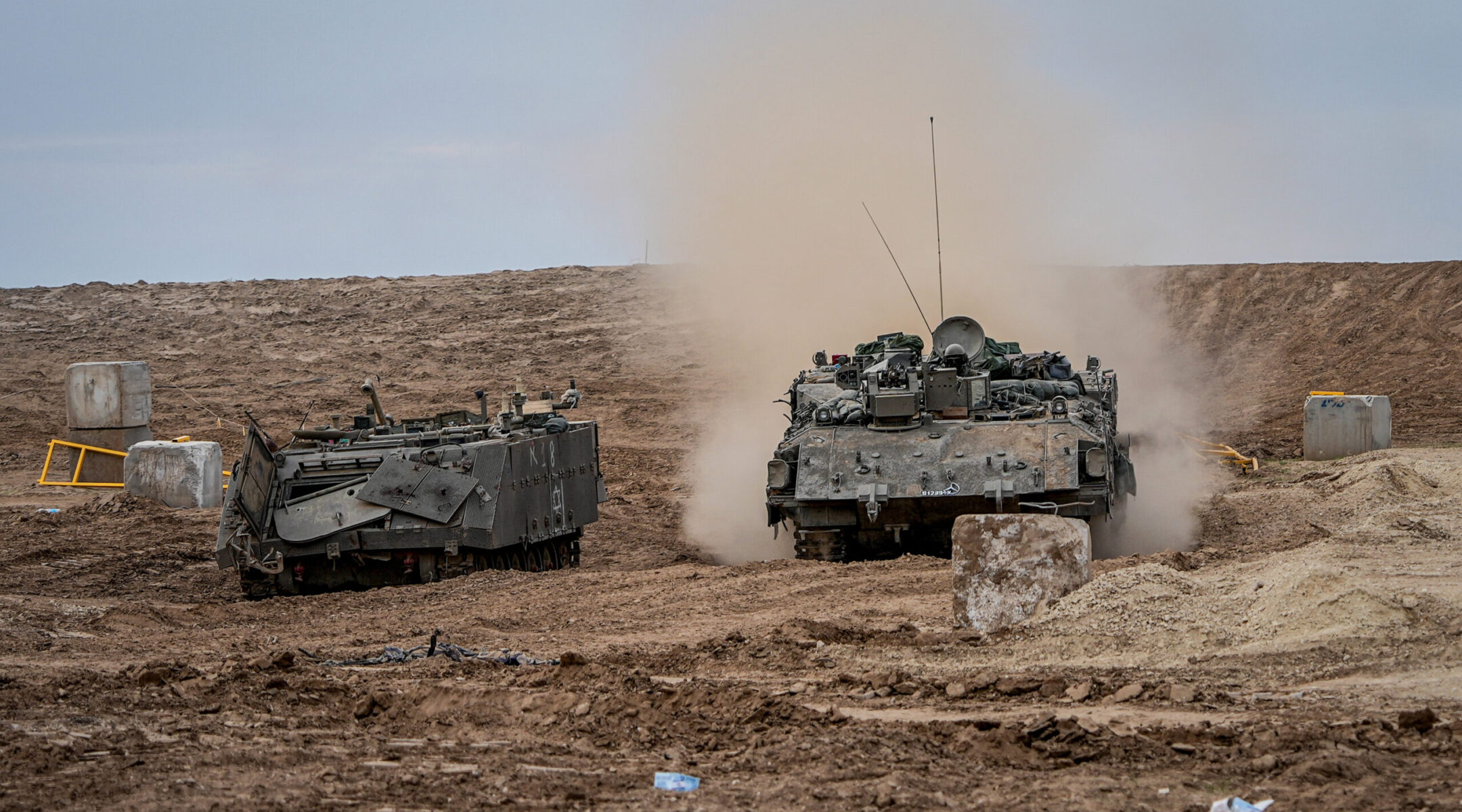(JTA) – The son of an Israeli government minister and former military chief of staff was killed in combat in Gaza on Thursday, as Israel continued its war against Hamas, killing some of the terror group’s senior officials amid mounting civilian and troop casualties.
Gal Meir Eisenkot, 25, the son of former Israel Defense Forces chief Gadi Eisenkot, died in Gaza while serving as a reservist in a commando unit. Another soldier, reservist paratrooper Jonathan David Deitch, was declared dead at the same time, bringing the number of Israeli troops who have been killed in the ground invasion of Gaza to 89.
The elder Eisenkot led the IDF from 2015 to 2019. He is a member of the National Unity party led by Benny Gantz, who preceded Eisenkot as IDF chief of staff. Eisenkot is a member of Israel’s emergency wartime government and is an observer in the war cabinet directing the Gaza campaign.
In Israel, where most Jewish 18-year-olds across social and economic sectors are conscripted into the army and many serve in reserve duty for years afterward, few are immune from the possible consequences of the war. More than 300,000 reservists were called up two months ago for Israel’s current campaign, and its casualties have spanned a range of ages and backgrounds.
Israeli Prime Minister Benjamin Netanyahu said he was “heartbroken” in a public statement to Gadi Eisenkot.
“We weep with you. We embrace you,” Netanyahu said. “The government of Israel and the citizens of Israel mourn together with you. Our heroes did not fall in vain. We will continue to fight until victory.”
Gantz said, “On the eve of Hannukah, Gal’s light was extinguished.”
He continued, “In this terrible moment, I know that the strength of you and yours will withstand the loss. We will be with you.”
The casualties occurred as Israel is deepening its campaign in southern Gaza, which began nearly a week ago following a seven-day ceasefire with Hamas. The IDF is now focusing its firepower on the area surrounding the city of Khan Younis, where Hamas leaders, including its Gaza chief Yahya Sinwar, live.
Hamas, which controls Gaza, began the war on Oct. 7 with an invasion of Israel in which terrorists killed 1,200 and took some 240 hostages, the majority of whom are still in captivity. Israel has vowed to depose the terror group and has responded with extensive airstrikes as well as a ground invasion that began in Gaza’s north and has shifted south.
The IDF also said Thursday that it had killed two senior Hamas operatives, Abdel Aziz al-Rantisi and Ahmed Aiush, in a recent airstrike. Rantisi was responsible for intelligence operations in Gaza and was involved in the planning of Hamas’ Oct. 7 attack on Israel, and Aiush was a senior intelligence operative, the IDF said.
The Hamas-run Health Ministry in Gaza says more than 17,000 people have been killed in the war. The figure is not verifiable and does not distinguish between civilians and combatants, or those killed by misfired Palestinian rockets.
Israeli authorities said that Hamas has continued to fire rockets from civilian areas, as the IDF attempted to evacuate civilians in Gaza from combat zones. A significant proportion of the Gazan population has been displaced by the fighting, and humanitarian groups say many are lacking essential supplies.
The growing death toll has led to a rising tide of calls among international leaders and progressive activists for a ceasefire, which Israel rejects because it would leave Hamas in power. The United Nations secretary-general, Antonio Guterres, on Wednesday invoked a rarely used article of the U.N. charter to appeal for a ceasefire, warning of a humanitarian catastrophe in Gaza.
Israeli Foreign Minister Eli Cohen lashed Guterres for the move, saying on social media that the U.N. leader was a “danger to world peace” and that his call for a ceasefire “constitutes support of the Hamas terrorist organization and an endorsement of the murder of the elderly, the abduction of babies and the rape of women.”
Also Thursday, an Israeli civilian was killed by a Hezbollah anti-tank missile in an agricultural area near the community of Mattat near the Lebanese border, Hebrew media reports said. The area has seen sporadic strikes between Hezbollah forces and Israeli troops since the outbreak of the war.
The IDF said it had launched airstrikes against Hezbollah “terror infrastructure” in Lebanon in response. On Thursday night, rocket alert sirens sounded in northern Israeli communities.
JTA has documented Jewish history in real-time for over a century. Keep our journalism strong by joining us in supporting independent, award-winning reporting.






